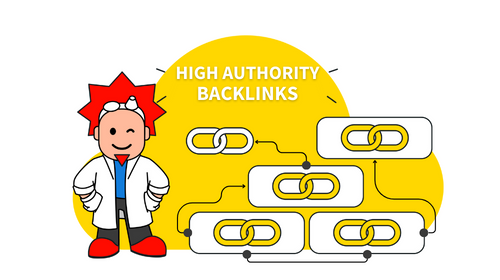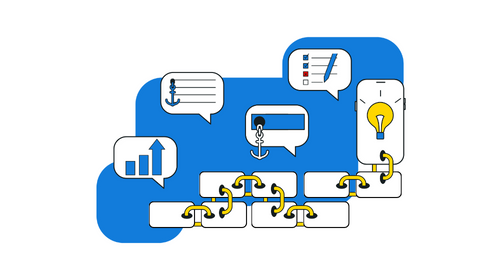Do you want to know how to get backlinks from high-authority websites? If so, you're in the right place! In this blog post, we will discuss the process of obtaining high-authority backlinks. We'll also provide a step-by-step guide on how to do it.
Obtaining high-quality links is one of the most important aspects of SEO. They help improve your website's ranking and visibility in search engines.
So if you want to take your SEO game up a notch, read on!
What Are High-Authority Backlinks?
A high-authority backlink is a link that comes from a website with a high domain authority (DA) or domain rating (DR).
Domain authority is a metric developed by Moz that predicts how well a website will rank in search engines. It ranges from 0 to 100, with higher scores indicating a greater ability to rank.
Domain rating, on the other hand, is a metric developed by Ahrefs. Like DA, it also predicts how well a website will rank in search engines. However, DR ranges from 0 to 100, with higher scores indicating better link equity and link popularity.
In general, websites with high DA and DR scores are more likely to rank higher in search engine results pages (SERPs). They also tend to have more high-quality links pointing to them.
Why Are High-Authority Backlinks Important?
If you'd like to check a website's domain authority, you may install MozBar on your web browser. For domain rating, you may use Ahrefs' Site Explorer tool.
Let's see a few examples of high-authority websites.
YouTube has a domain authority of 100 and a domain rating of 99.
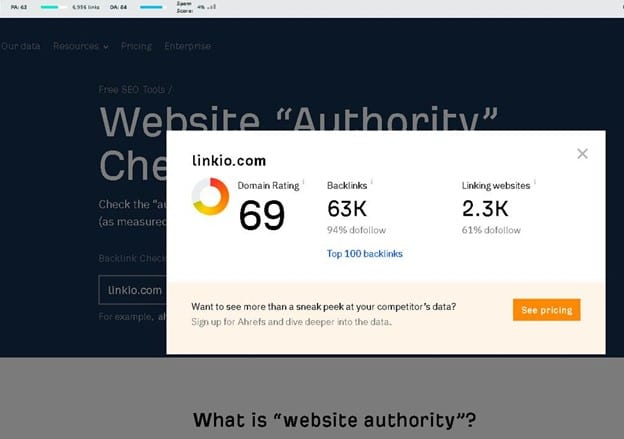

The New York Times has a domain authority of 96 and a domain rating of 94.

Linkio has a domain authority of 34 and a domain rating of 69.
Getting a high-authority backlink from New York Times pointing to your website would significantly boost your SEO. It would help you more than getting 100 links from low-authority websites.
The link would act as a vote of confidence, telling search engines that your website is high-quality and trustworthy. As a result, you will see an improvement in your website's ranking and visibility.
On the other hand, if you're getting links from low-authority websites, it might even hurt your SEO. That's because search engines might view those links as poor quality. So it's essential to be selective about the websites you get links from.
Get Dofollow Links From High-Authority Websites
Also, it's crucial to get dofollow links from a high-authority website. A dofollow link is a link that passes link juice or link equity to your website. This helps improve your website's ranking.
On the other hand, a nofollow link is a link that doesn't pass link juice or link equity to your website. So if you're getting a nofollow link from a high-authority website, it won't help your SEO.
To check if a link is dofollow or nofollow, go to a web page, select a link, click the right button of your mouse, and choose to inspect.
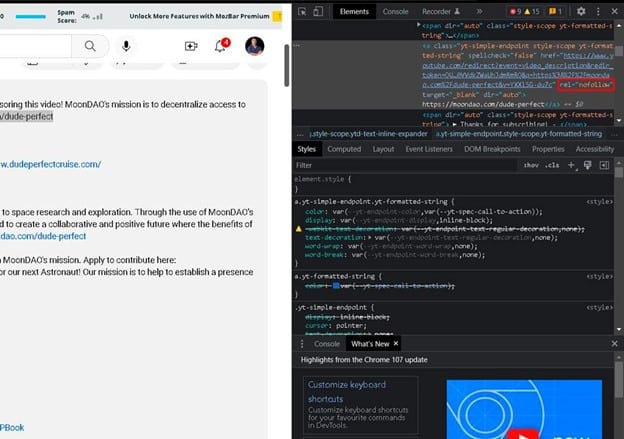
If you see on the HTML code rel="nofollow," it means the link is nofollow. If you don't see that code, the link is dofollow.
3 Misconceptions About Link Building
Now that we've discussed what high-authority backlinks are and why they're important, let's dispel some link-building misconceptions.
Misconception #1: The more links you have, the better (edit)
This is not true! It's not about the quantity of links but the quality of those links.
Having a link from a high-authority website is more valuable than having 100 links from low-authority websites.
In fact, if you're getting too many low-quality links, it might even hurt your SEO. So focus on getting high-quality backlinks from websites with high domain authority or domain rating scores.
Misconception #2: Backlinks aren't important
You have many influencers claiming backlinks aren't necessary. Content is king! Yes, content is king. You should learn how to properly SEO (Search Engine Optimize) your website and write high-quality content. But that's not enough.
If you want your website to rank higher in search engines, you need backlinks. In fact, backlinks are a huge ranking factor for Google.
A study by Moz shows that the number of backlinks is one of the most important ranking factors for SEO.
The study analyzed the link profiles of the top 50 search results for 10,000 high-traffic keywords. The result? Backlinks are still a very important ranking factor.
In short, don't listen to people who say backlinks aren't necessary. They're wrong!
Misconception #3: link building is dead
Link building isn't dead. In fact, it's more important than ever.
Yes, link building has changed over the years. The days of link buying and link farms are gone. But link building is still a crucial ranking factor for SEO.
If you don't believe me, just look at Google's Search Quality Guidelines. They state that links are a very important ranking factor.
So link building is definitely not dead. It's just evolved over the years.
How to Get High-Authority Backlinks?
I'm going to talk about three effective ways to get high-authority backlinks. So let's get started!
STEP 1) Design a Professional-Looking Website
Often, people think they should immediately jump to building links and forget the basics. The first step is to have a professional-looking website.
Your website should be well-designed, mobile-friendly, and easy to navigate. It should also have high-quality content that's relevant to your niche.
If you don't have a professional-looking website, you will have a hard time getting high-authority backlinks. That's because no one wants to link to a website that looks like it's from the 90s.
So take the time to design a professional-looking website. I suggest using WordPress because it's easy to use, and tons of themes and plugins are available.
You should also install lightweight themes and plugins to load your website faster. Google loves fast websites!
Some themes worth checking out are:
- GeneratePress
- Astra
- Neve
Some plugins that can help speed up your website are:
- W3 Total Cache
- WP Rocket
- LiteSpeed Cache
There are many other great themes and plugins out there. These are just a few of my favorites.
STEP 2) Publish High-Quality Content
The second step is to publish high-quality content on your website.
Your content should be relevant to your niche, well-written, and engaging. Also, you should optimize your content for Google search engines. You can find out how to do that by reading my SEO guide.
But what type of content should you publish? Here are a few ideas:
- How-to guides
- Tutorials
- Lists (e.g., top 10 lists)
- Product reviews and comparisons
- Case studies
Google loves high-quality content, and so do readers. But not only, once you start outreaching out to other websites (which I'll talk about next), they're more likely to link to your website if you have high-quality content.
You should consider making linkable assets for your website. These are pieces of content that other websites would want to link to.
My preferred linkable assets are list posts and ultimate guides. They're both link magnets because they're usually very comprehensive and easy to understand.
Step 3) Strategy #1 - Write Guest Posts
I have tried several strategies to build backlinks over the years. However, good old guest posting is still the best way to get high-quality backlinks.
Guest blogging is when you write a blog post for another website in your industry. In return, you get to include a link back to your website.
You want to write content for relevant websites. In other words, websites in the same or similar niche as yours.
For example, if you have a website about SEO, you can write a guest post for a website about link building or content marketing.
The link back to your website should be included in the author bio section or the body of the guest post.
How To Find Guest Blogging Opportunities?
One way to find websites to outreach to is to use a tool like Ahrefs and check your competitor's backlink profiles.
- Find a few high-authoritative websites with a good link profile in your niche.
- In Ahrefs, add the URL of one of these websites to the "site explorer."
- Then click on "Backlinks" and then "New/Lost."
- If they're publishing guest posts, you'll see them here. You can then outreach to these websites and ask if they're interested in publishing a guest post from you.
Another way to find guest blogging opportunities is to Google "[Your niche] + write for us" or "[Your niche] + contribute."
For example, if you're in the SEO niche, you can Google "SEO + write for us" or "SEO + contribute."
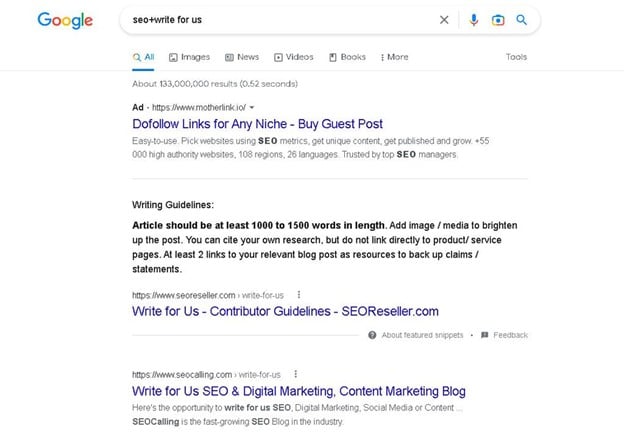
You want to list on a Google spreadsheet or a tool like Mention all the websites that appear in the search results.
Then, you can outreach to these websites and pitch them a guest post idea.
What Should You Include In A Guest Post Pitch?
Your pitch should be short, sweet, and to the point.
I like to say hello and tell them my name and what my website is about. I then say why I like their website and what kind of guest post I would like to write for them.
I also show some of the other things I have written, like guest posts, to give them an idea of my writing style. If you still need guest posts, provide links to your best blog posts. Then I'll tell them my idea for a guest post (make sure it's relevant to their website).
Your pitch should look something like this:
Hey name,
I'm name, and I run website dot com. On my website, I talk about X, Y, and Z.
I've been following your website for a while now, and I really like it. I especially loved your post about ABC.
Here's some of my previous work:
- Your post 1
- Your post 2
- Your post 3
I would love to contribute a guest post to your website about XYZ. Here are a few ideas:
- Idea 1
- Idea 2
- Idea 3
If you're interested, I can send over a few sample articles that I've written.
Thanks,
Your name
If you want to automate and speed up this process, check Linkio. This software was created to help professionals with their cold outreach and prospecting. It is a process-oriented software that streamlines your workflow so you can get the most out of your time.
Click here to learn more about Linkio.
3 Important Keys To Remember About Guest Posting
Before we move on to the second link-building strategy, I want to share three things you should keep in mind when guest posting:
- Scale Up Your Link Building
If you have a brand new website, you should be pitching to something other than Forbes or Entrepreneur. It's important to start small and then scale up your link-building over time.
Pitch to websites with a DA or DR score of 40-50. Once you have good links from these websites, you can start pitching to websites with a higher DA or DR score.
- Time-Consuming And Monotonous
Building an outreach list and crafting custom emails to send to those websites takes time and effort.
Link building is a process that requires consistency and persistence. You need to be sending outreach emails regularly to see results. I recommend sending at least five emails daily.
- Many Won't Reply
Of the websites you pitch, only a small handful will actually reply back to your email. And of those who answer, an even smaller number will say yes to your guest post idea.
Don't get discouraged if you don't get a lot of yeses at first. The more you practice link building and the more authoritative your website becomes, the easier it will be to get guest post opportunities.
Now let's go to the second way to get high authority links.
Step 4) Strategy #2 - HARO (Help A Reporter Out)
HARO is a website where journalists and bloggers post queries to get sources for their articles.

If you provide a quote or relevant data to the query, you can get your name and website featured in a high-authority publication.
To use HARO, create an account, and then you'll receive emails with different queries to which you can respond.
The process looks something like this:
- You get an email from HARO with different queries.
- You reply to the query that's relevant to your niche or expertise.
- If the journalist likes your response, they'll include your quote in their article and link to your own website.
HARO is a great way to get your brand's exposure and earn high-quality backlinks. You can quickly reply to some of these queries daily.
Just make sure that your response is relevant to the query and that you're providing value.
If you can do that, you'll start seeing your name in big publications.
Step 5) Strategy #3 - Resource Page Links
A resource page is a page on a website that lists different resources on a specific topic.
For example, if you have a website about link building, then you might have a resource page that lists out different link-building guides.
The goal of a resource page is to provide visitors with a list of high-quality resources all in one place.
To get a link from a resource page, you need to find resource pages in your niche or industry that link to similar resources.
Then you can reach out to the website owner and let them know about your resource. They may link to it from their resource page if they find it valuable.
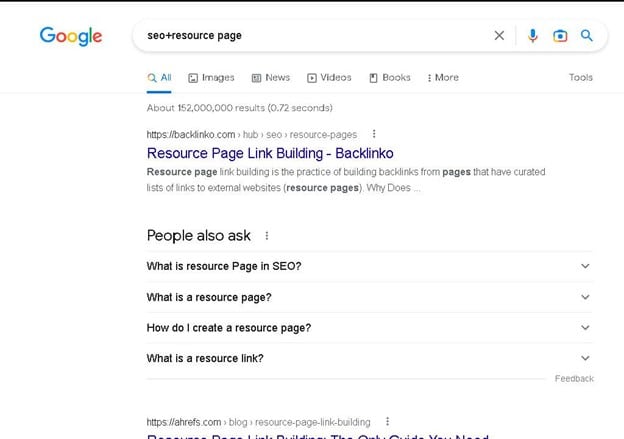
Here's a quick overview of how to find and contact resource pages:
- Use Google to find resource pages in your niche. Try using keywords like "keyword + resource page" or "keyword + link roundup."
- Once you find a relevant resource page, check if they link to similar resources. If they do, then there's a good chance they'll link to yours.
- Reach out to the website owner and inform them about your resource. Make sure to link to your resource in your email so they can easily check it out.
Resource page links are a great way to get high-quality backlinks from relevant websites. By following the steps above, you can quickly find and contact resource pages in your niche.
Step 6) How To Track Your High Authority Backlinks
Now that you know how to get high-authority backlinks, it's crucial to track your progress so you can see the results of your link-building efforts.
There are a few different ways to track your links. The first is to use Google Analytics.
Google Analytics is a free tool that you can use to track your website's traffic and performance.

To use Google Analytics, you'll need to create an account and add some code to your website. If you have a WordPress website, you can install the Google Analytics plugin to make this process easier.
Once you have Google Analytics set up, you'll be able to track your website's link-building progress by looking at the referring site's section.
This section will show you all the websites linked to your site. You can track your link-building progress over time by looking at the number of referring sites.
Wrap-Up
Link building is a process that requires consistency and persistence. You need to be sending outreach emails regularly to see results.
And don't forget about strategies like HARO and resource page links. These are both great ways to get high-quality backlinks from high-DA sites.
If you follow the strategies in this guide and put in the work, you'll start seeing more link opportunities come your way. And eventually, you'll be able to get high-quality backlinks from some of the best websites on the internet.
About the Writer
Jordan Alexo is a digital marketer who's been making money online since 2011. He specializes in self-publishing, content creation and teaching others how to do the same thing he does best! He inspires you on his website with strategies that have worked for him and product reviews that help you grow your online business.
